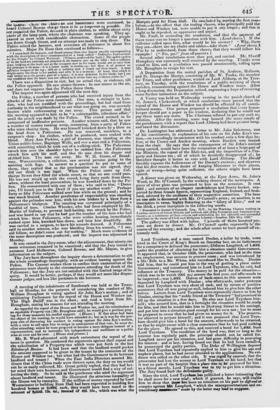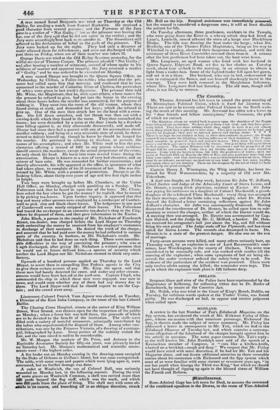• • • ,
Lord Teynham, and a man named Double, a tailor by trade, were tried in the Court of King's Bench on: Saturday hot, on an' indictment for a conspiracy to defraud the presecutOriDidienus Laneford,"of 1,400t. under the promise of obtaining for him a situation tinder Gaveinment. It appeared that, in October 1828, theProaecutor, who had the time' no employment, was anxious to procure some ; and was introduced by a Mr.' Erie to a-Mr.. White, who imp:awed-him to.:Dourati. Doulan told -him; that he could put 'him. in Ale-way of .ge:tting a place wider Government; and introduced hint, to:Lord Teynhani, who,be said, had influence at the Treasury. The money to be paid fur; the which was to be wotth 2001. per annum' the first year, and 'afterwards to be improved—was 14001. Halves of hank,notes.tothis amount were deposited by Langford with Doulan; who iiket.wards, tinder pretence that Lord Teynham was, very short Of Cask and by 'means of positive assurances that all was' going on well, induced. him, to.gi ye him the other halves. Letters from Lord Teynbam were repeatedly shown to him by Doulan, stating that his "noble friend afthe Treasury '7' liadpromised to fill up the situation in a few days. He also Saw Lord Teynham self; who assured him, that in a fortnight the situation Would be.ready for hinvand that be would take him to Dowaing.Street in his carriage, and put him into a situation good enough for his-own son ; but be must be prepared to swear that lie had given no-money for ,it. The prosecu- tor objected to perjure himself; and hams propesed. that Lord Teyn- ham should give him a bond for the amount, afterwards to be returned, so that be might swear with a clear conscience that belied paid nothing for the place. He agreed to this,and received a bond fig 1,400/..from Lord Teynham. The condition of the bond was' :that so Imig as ;the interest was regularly paid, the principal should net be milled. for. Lansford never got his situation, and had great difficulty in procurin his interest : and at last, having found out that he had been swindled, he prosecuted the guilty parties. The Bake of Wellington deposed that Lord Teynham had repeatedly applied to him to give his son and nephew places, but he had never attended to the applications. No.evi- deuce was called on the other side. It was urgedby counsel, that the prosecutorliad lent the money to Lord Teynham on his bond, but that it aira no part Of the batgain that a place was to_be- procured for him : as a friend merely, Lord Teynham was to of to get him a sittietion. The JurYfOund both-the defetidants guilty. • • • ' Since the trial, Lord Teynham has published a letter intimating that be shall move for a new trial ; which if _granted, he says, will enable him to show that Uwe Ms been no intention on his part to •Xefixtudor conspire against Mr. Langford, "which the mierepreeentationsind ex-
traordinary staestamita" made by the latter may lead to suppoat. A man named Israel Benjamin was tried on Thursday at the Old Bailey, for stealing a watch from Simuel Rackwitz. He received a gOod character from several persons ; and the Foreman of the Jury gave in a verdict of "Not Guilty ." but as the prisoner was leaving the bar, one of the Jury said that he ;lid not agree in the verdict ; and the Jury were accordinglYtent back to reonsider it. The dissentient still adhered to his declaration of belief in the guilt of the prisoner. The Jury were locked up for the night. They had only a decanter of water allowed them for refreshment ; and were not discharged till half- past three on Friday, when one of their number was taken ill. George Davis was tried at the Old Bailey Sessions yesterday, for the wilful murder of Thomas Cooper. The prisoner pleaded "Not Guilty ;" and after hearing a number of witnesses, several of whom spoke to his wildness of manner and apparent insanity, the Jury returned a verdict of" Guilty," and be was ordered to be executed on Monday.
A man named Sharpe was brought to the Queen Square Office, on Wednesday, by Clifton, a Police constable; who stated that the pri- soner had called upon him that morning, and confessed that he was concerned in the murder of Catherine Elms of Chelsea, the particulars of whica were given in last week's Spectator. The prisoner then told Mr. White, the Magistrate, that he, with some others, whose names for the present he refused to give, had got into the house in the evening about three hours before the murder was committed, for the purpose of robbing it. They went into the room of the old woman, whom they found sitting at work, and demanded her keys; which she refused to give up. One of the men then struck her on the bead with a crow- bar. She fell down senseless, and her throat was then cut with a carving-knife which they found in the room. They then ransacked the house ; but were disturbed by a noise at the door (made by a drunken man falling against it, as they afterwards discovered), and made off. Sharpe had since then had a quarrel with one of his accomplices about another robbery; and being in a very miserable state of mind, he deter. minedto deliver himself up, though he knew he should be hanged for the murder. He persisted in refusing to disclose, at present, the names of his accomplices ; and when Mr. White read to him the pro- clamation offering a reward of 100/. to any person whose evidence should convict the murderer, except the actual perpetrator of the crime, be only shook his head. He burst into tears several times during the examination. Sharpe is known as a man of very bad character, and an utterer of base coin. He was remanded for further examination ; and shortly afterwards, his wife appeared at the office, in ignorance of what had taken place, to complain of his ill treatment of her. She was dis- missed by Mr. White, with a promise of protection. Sharpe is an ill- looking fallow, about thirty-two years of age and five feet eight inches in height. Two boys were brought up before Mr. Chambers, at the Union Hall Office, on Monday, charged with gambling on a Sunday. The Policeman said, that he found 2s. upon one of the boys. Mr. Cham- bers asked the boy where he got the money ? he replied, that he earned it by picking tea-leaves. Upon further inquiry, it appeared that this boy and many other persons were employed by a cowkeeper of Camber- well to pick sloe and black-thorn leaves. The hedgerows in one part of Camberwell were nearly stripped of their leaves. The Policeman bad traced the cow keeper to an extensive tea-dealer's shop in the City, where he disposed of them, and then gave information to the Excise.
John Black, a person in the employ of Mr. Nicholson of Fenchurch Street, tea-dealer, was charged before the Lord Mayor on Thursday with embezzling the money he received from his employer's customers in discharge of their accounts. lie denied the truth of the charge; and asserted that he had paid over the money he had collected in various parts of the country, to bankers, to Mr. Nicholson's credit. Mr. Nicholson said that he had done no such thing. There were consider- able difficulties in the way of convicting the prisoner ; who was at Lngth discharged, after giving Mr. Nicholson a written promise that he would not in future defraud him,—a species of security which neither the Lord Mayor nor Mr. Nicholson seemed to think very satis- factory.
Upwards of a hundred persons applied on Thursday to the Lord Mayor, to assist them in compelling Don Pedro's agents in the City to give them certain atrears of pay. Mr. King. the agent, said that these men had basely deserted the cause, and under any other circum- stances would have been hanzed at the yard-arm. Captain Floyd, who
coMmanded the ship in which these men wers engaged, was now in , town, and would state whether any of them had any money due to them. The Lord Mayor said that he should expect to see the Cap- tain; and the crowd went away.

















 Previous page
Previous page